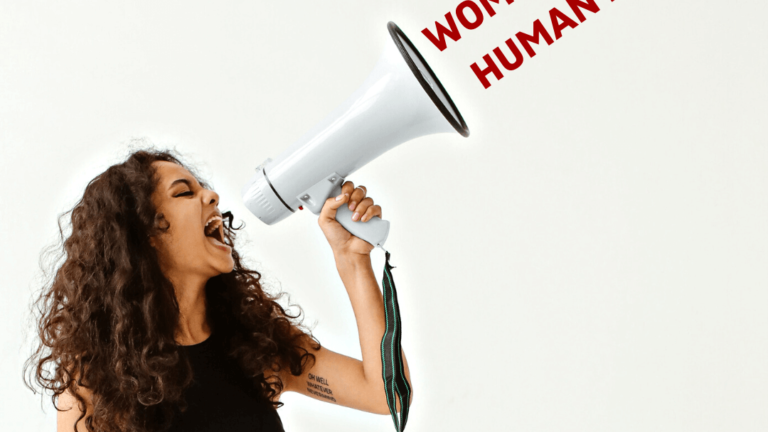Globally, women have struggled for equality and stood against oppression from societies. Society’s perception of women can vary depending on the culture, community, and historical context in which they live. Some countries have indeed shown certain improvements such as women’s rights to vote, improved laws against domestic violence, equal access to education, and so on.
However, there are still a few countries that do not have laws against child brides, honor killing, female genital mutilation, inadequate healthcare, and sexually abused victims. Such societies have viewed women as inferior to men and they have been assigned to specific roles such as being responsible for child-rearing and household chores. The women’s rights movement has addressed these issues, campaigned on the streets, and demanded the people in power must preserve and respect women’s rights.
In addition, many social issues are particularly relevant to women’s rights, including:
Gender Discrimination
It is everywhere and at every stage of life, women face gender discrimination including in education, employment, and pay. It begins in early childhood and thereby limits the lifelong potential rights of girls around the world. Furthermore, such discrimination causes gender inequality to be routinely privileged or prioritized given over another. It prohibits women to access almost every human rights treaty. Young girls and women face lifelong consequences in their homes, schools, and communities. This can take many forms, including overt discrimination, such as being denied opportunities because of one’s gender, and more subtle forms, such as being passed over for promotion or being paid less than men for doing the same work.
Sexual Harassment
Sexual harassment is an unwelcome behavior pattern that makes a person feel offended, humiliated, and intimidated. Often faced by girls and women, that occur in any setting, including home, streets, school, workplace, and social events. It can also happen online through messaging apps, social media, and other digital platforms. It includes physical, verbal, or nonverbal actions that are sexual in nature, or that are directed at someone because of their gender. It specifically refers to harassment of women, including:
- Unwanted physical contact or advances, such as touching, kissing, or fondling
- Verbal harassment, such as sexual jokes, comments, mocking, or racial slurs.
- Nonverbal harassment, such as winking, flying kisses, stalking, or making sexually suggestive gestures through physical movements.
- Displaying or distributing sexually explicit materials, such as pornography or sexually explicit emails.
- Threatening or intimidating behavior.
It is important to remember that sexual harassment is never the fault of the victim. Therefore, sexual harassment is a widespread problem that disproportionately affects women.
Reproductive rights
Women should have the right to choose whether she wants to reproduce or not, including the right to decide whether she wants to carry or terminate an unwanted pregnancy. She should have the right to have family planning and access to use contraception. Women face tremendous health risks due to the lack of safe and legal access to abortion in many countries. Such women are forced to undergo unsafe methods to terminate unwanted pregnancies causing life-threatening risks. Reproductive rights should give the ability of women to control what their body wants. It’s an ethical right to contraception, abortion, fertility treatment, and reproductive health. In several countries, women’s reproductive rights are still challenged, including access to contraception and abortion, which are often the subject of social and political debates.
Specifically, reproductive rights for women may include:
- The right to access contraceptive methods and information to prevent unintended pregnancies.
- The right to access safe and legal abortion services.
- The right to access prenatal care and childbirth services.
- The right to access information about fertility, infertility, and assisted reproductive technologies.
- The right to make decisions about their reproductive health, including whether or when to have children, without coercion or discrimination.
These rights are essential for the health, well-being, and equality of women. However, reproductive rights are not always respected or protected in practice, and women may face barriers to accessing the information and services they need to make informed decisions about their reproductive health. Governments, healthcare providers, and other stakeholders need to ensure that women have access to the information and services they need to exercise their reproductive rights.
Domestic violence
Domestic violence also known as domestic abuse often been targeted at women. It appears in many behavioral patterns to gain or maintain power over women’s rights. It tends to control an intimate partner and threaten by way of physical, sexual, emotional, and psychological actions. One of the most common violence is experienced by women in abusive relationships.
Signs of Domestic violence:
- Calls you by racial names, insults you, or disrespects your morale in front of people.
- Threatens or prevents you from working in the office or restricts meeting family members or friends.
- Forcing isolation from everyone, keeping track of every move.
- Control your money, Access your bank accounts, and passwords.
- Acts jealous or possessive and constantly checks phones.
- Accuse you of being unfaithful.
- Trying to hurt a partner by hitting, kicking, burning, grabbing, pinching, shoving, slapping, hair-pulling, biting, denying medical care
- Control what you wear.
- Often get a short temper while drinking alcohol or using drugs
- Threatens or blackmails you with violence or a weapon
- Often hit or slap you over petty issues.
- Tries to hurt your children or your pets.
- Forces you to intimate or engage in sexual acts against your will.
- Blames you for his violent behavior.
Domestic violence is a serious problem that disproportionately affects women. It leaves life-long scars on women’s physical and mental health.
Maternal health
Maternal health refers to the health of women during pregnancy, childbirth, and the postpartum period. Ensuring maternal health is important for the health and well-being of both mothers and their children. Pregnancy and childbirth can be a time of great physical and emotional changes for women. Pregnant women need to receive regular prenatal care, which includes check-ups, screenings, and support from healthcare providers. This can help identify and address any potential health issues that may arise during pregnancy.
The major complication that accounts for countless maternal injury and death are severe bleeding, vaginal infection, blood pressure disorder, unsafe abortion, lack of medical treatment, and complication during childbirth. Many social and economic factors can impact maternal health, including access to healthcare, cultural practices, and discrimination. Due to the lack of access to adequate healthcare, there are several deaths related to pregnancy, menstrual hygiene, still childbirth.
Several measures can be taken to improve maternal health, including:
- Providing access to quality prenatal care and childbirth services.
- Ensuring that women have access to adequate nutrition during pregnancy.
- Educating women about the importance of maternal health and the steps they can take to promote their health and the health of their children.
- Supporting women and their families during pregnancy, childbirth, and the postpartum period.
Aging
Women often face specific challenges as they age, including discrimination in the workplace and a lack of support for elderly caregivers. Older women tend to face the hardest recessions, more unemployment, pension hike, and many lost jobs. Moreover, divorced women have much lower incomes and higher poverty rates as they age. In addition, women who find themselves widowed face grief, depression, and wrath of the society.
There are several challenges that women may face as they age, including:
Physical changes: As women age, their bodies may go through many physical changes, such as menopause, which can cause symptoms like hot flashes, sleep disturbances, and changes in metabolism. These changes can be difficult to adjust to and may require medical treatment.
Health issues: As women age, they may be more at risk for certain health conditions, such as heart disease, osteoporosis, and certain types of cancer. It is important for women to be aware of their risks and to take steps to prevent or manage additional health concerns such as heart disease, physical injuries, chronic pain, diabetes, depression, and anxiety.
Financial challenges: Women may face financial challenges as they age, particularly if they have not saved enough for retirement or if they are out of the workforce for an extended period. This can make it difficult for them to support themselves and may require them to rely on social support systems or financial assistance from others.
Social isolation: As women age, they may experience social isolation due to a variety of factors, including the loss of friends and loved ones, decreased mobility, and reduced access to social activities. This can lead to loneliness and a sense of isolation.
Caregiving responsibilities: Many women provide care for aging parents or other family members as they age, which can be physically and emotionally demanding. This can be particularly challenging if they are also trying to manage their health issues and financial challenges.
It is important for women to be aware of these challenges and to take steps to address them to maintain their health and well-being as they age. This may include seeking medical treatment for health issues, planning for retirement, staying socially active, and seeking support when needed.
Bottom Line
After all, women’s rights are human rights! This means, women will be given equal fundamental rights as men, and such rights should be preserved, protected, and promoted by Governments, International Organizations, and civil society groups. Women are access to the right to life, privacy, liberty, protection, education, work and receive equal pay; the right to participate in political and public life; the right to freedom of movement, association, and torture; access to healthcare and safety; the right to live free from violence, discrimination, and exploitation.
Overall, it is important to recognize and challenge negative stereotypes and biases about women, and to work towards creating a society that values and respects all people, regardless of their gender. Even today, women in male dominant societies face discrimination and negative stereotypes. We should put an end to the sexual exploitation of women, women’s harassment, and oppression to achieve women’s equal rights to put in practice.





